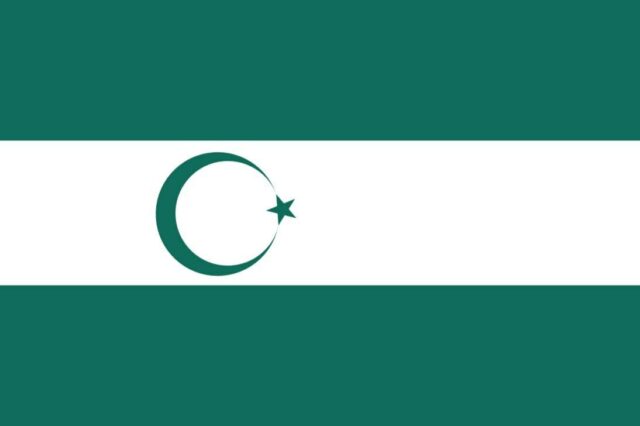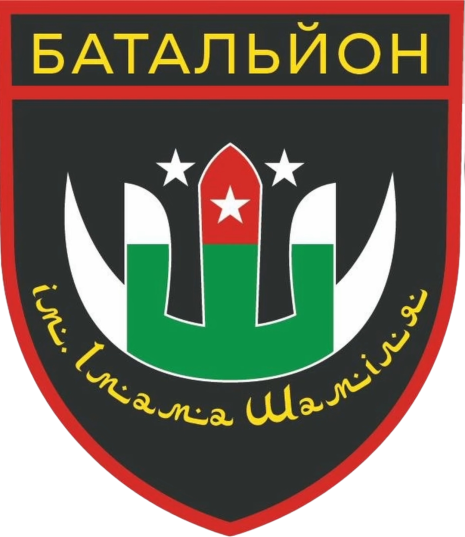
Kavkaz Files ISSN 2975-0474 Volume Issue 18 Issue 5
Author: Giuliano Bifolchi
The establishment of the Dagestan National Centre in Russia and the Dagestan Volunteer Battalion ‘Imam Shamil’ in Ukraine underscores the reverberations of the Ukraine conflict in the North Caucasus. This development highlights a substantial threat emanating from various movements and organisations, advocating for the destabilisation and fragmentation of the Russian Federation.
This report aims to comprehensive investigate the Dagestan National Centre, in tandem with the associated Dagestan Volunteer Battalion ‘Imam Shamil’, with the primary goal of gauging their potential influence on the stability of Dagestan and the broader North Caucasus region.
The Dagestan National Centre: Background Information
In September 2022, the socio-political organisation Dagestanskij Nacional’nyj Centr (Dagestan National Centre – DNC) opened its Telegram Channel and promoted its purpose to ‘free the republic of Dagestan from the Russian occupation’.
In the first message appeared on his Telegram Channel, the Dagestan National Centre published is manifesto. The group stressed Dagestani people should not join the Russian army in the fight against Ukraine and, therefore, prefer to be in jail instead of ‘death and dishonour’.
DNS exhorted mass disobedience and the creation of strike committees on a territorial basis to organise a nationwide manifestation under the slogan ‘No War! No mobilisation! Yes to Independence’.
The DNC published also its flag, which is a rectangular panel of three equal-sized horizontal stripes: the top is green, the middle is white and the bottom is green, with the image of a white crescent and star on a white stripe closer to the pole. The flag is based on the banner of the North Caucasian Imamate, the sanjak banner of Imam Shamil, and the national flag of the North Caucasus Emirate.
The green colour represents the religion of Islam, prosperity and well-being, the white colour of the stripe symbolises the road along which the people of Dagestan must go in order to become independent.
The white colour represents also the Aṣ-Ṣirāṭ al-Mustaqīm, Arabic term that means ‘the straight path’. This term is mentioned 33 times in the Quran and is well known because it appears in the Sura Al-Fātiḥa. The crescent and star depicted on the flag are traditional symbols of Islam.
Analysing the communication and messages that the DNC shared with its 8 thousand followers, they often depict Russia as weak. Indeed, the DNC has often stressed that there is the possibility of a territorial disintegration of the Russian Federation, which might give the opportunity to Dagestan to become independent.
In this context, the DNC believes that an independent Dagestan might live in peace and economic prosperity thanks to its strategic position on the Caspian Sea and its richness in oil and gas, natural resources which might attract the interests of foreign countries as well entrepreneurs from Turkey, Iran and Azerbaijan.
On November 25th-26th, 2022, the head of the Dagestan National Centre, Dzhabrail Mirzoev, participated in the 1st International Congress of the United Diaspora of the Chechen Republic of Ichkeria, organised in La Rochette, a suburb of Paris.
According to a Telegram Channel post, Ali Charinskiy is the deputy head of the Dagestan National Centre. In February 2023, he gave several video interviews and promoted the centre’s petition to exclude the Russian Federation from Interpol.
Western media invited several times Charinskiy to comment the situation in Dagestan, especially since the beginning of the Ukraine conflict. The US media outlet Fox News reported that Ali Charinskiy “fled from the Kremlin in 2016 after being accused of ‘justifying terrorism’ in his work to cover human rights abuses across not only the Caucasus Mountain regions but in areas like Crimea.”
Russian sources described a different version of Charisnkiy’s status. According to EurAsia Daily, Ali Charinskiy is the nickname of Arslan Mirzaev, a native of Dagestan that Russian authorities accused to be an ideologist of terrorism and a preacher of the Hizb ut-Tahrir al-Islami, an organisation which is banned in the Russian Federation.
In March 2022, Kavkaz Uzel stated that the Russian authorities opened a criminal case against the blogger Arslan Mirzaev, known with the nickname Ali Charinskiy, for discrediting the Russian army and promoting fake news and instructions from the Centre for Information and Psychological Operations of the Ukrainian Armed Forces.
The Dagestan Volunteer Battalion ‘Imam Shamil’:
Background Information

In its first post on Telegram, DNC affirmed that the centre created the Dagestanskij dobrovol’cheskij batal’on imeni Imama Shamilja (Dagestan Volunteer Battalion named after Imam Shamil) which supports the Ukrainian government in the fight against the Russian Armed Forces. The battalion consists mainly of members of the Dagestani diaspora in Ukraine. Its activities are mainly reconnaissance and sabotage operations.
Imam Shamil is a legendary figure in the North Caucasus since he fought against the Russian Tsarist forces during the Caucasian War (1817-1864) as the leader of the Caucasian Imamate and a Sunni Muslim Shaykh of the Naqshbandi Sufi Tariqa (Brotherhood).
On October 29th, 2022, at the conference Kavkazskij Sojuz (Caucasian Union) organised in Kyiv, Islam Belokiev, the speaker of the Shaykh Mansour Volunteer Battalion, confirmed the news about the establishment of the Dagestan Volunteer Battalion.
According to open sources, Magomed Ibragimovich Sajpulaev is the battalion commander and Ahmad Magomedovich Ahmedov is his appointed deputy. Apart from supporting Kyiv against Moscow, the Dagestan Volunteer Battalion seeks to create a separate Dagestani state from the Russian Federation.
Geopolitical Scenario
As SpecialEurasia noted since the onset of the Ukraine conflict, this geopolitical event has cast its profound influence over the North Caucasus and the Muslim umma (community) within the Russian Federation. Ukraine conflict’s repercussion continues to resonate across these regions, shaping the geopolitical landscape in unforeseen ways.
Previously, we reported the pivotal role played by the Chechen Volunteer Battalions ‘Shaykh Mansur’ and ‘Dzhokhar Dudayev’, which support the Ukrainian military forces against the Russian troops and advocate for the re-establishment of the Chechen Republic of Ichkeria in the Russian North Caucasus.
Early this year, different sources confirmed the presence in Ukraine of Rustam Azhiev, leader of Ajnad al-Kavkaz, a terrorist organisation which operates in Syria against the Russian military troops. Azhiev convened with Akhmed Zakayev, former Prime Minister of the Chechen Republic of Ichkeria, alongside a contingent of Chechen fighters stationed in Ukraine in support of Kyiv.
Within the volunteer battalion milieu, it is imperative to spotlight the Muslim Corp ‘Kavkaz’, an armed contingent composed of Muslim combatants hailing from the Caucasus. Notably, this group maintains a strong online presence, particularly on platforms such as Telegram, with Muaz Kabardinsky as its prominent representative.
We previously documented also the formation of the Ingush Independence Committee, an entity steadfastly advocating for the ‘de-occupation of Ingushetia’. This committee has given rise to the Ingush Liberation Army, a militarised force poised to defend its homeland under the banner of Islam.
In this context, Islam stands as a cornerstone defining the ethos of these volunteer battalions and affiliated organisations, all of which ardently promote the emancipation of their homelands from Moscow’s authority.
Consequently, the nexus between Islam and the North Caucasus assumes paramount importance in the Kremlin’s calculus, as adeptly managing these elements remains critical in forestalling potential internal destabilisation.
Within this context, the support extended by North Caucasian Muslim leaders to Russian President Vladimir Putin and Moscow’s so-called ‘special military operation’ in Ukraine takes on added significance. This support can be viewed as a strategic manoeuvre to safeguard regional stability and align with Moscow’s geopolitical objectives.
Conclusion
Considering the escalating prominence and digital footprint of volunteer battalions and autonomous organisations linked to the North Caucasus, it becomes imperative to scrutinise the potential ramifications of their activities, often bolstered by Ukrainian support.
This surge raises pertinent questions regarding the stability of the region and the resilience of Russian authority in the face of these developing dynamics.
The pivotal role of Islam within these organisations and paramilitary factions cannot be underestimated. It is crucial to find out whether this religious dimension may, in time, undergo a radical transformation akin to the trajectory witnessed in Chechnya towards the close of the 1990s and, then, the outset of the 21st century with the Imarat Kavkaz (Caucasus Emirate).
Such a metamorphosis could potentially culminate in volunteer battalions transmuting into militant groups, propagating jihad and radical ideologies not solely within the North Caucasus, but also within Ukraine, Russia and the entire post-Soviet space.
An additional pressing inquiry arises concerning the envisioned independence of North Caucasian republics like Chechnya, Dagestan, and Ingushetia, alongside the broader region. Could this prospect instigate heightened instability or serve as a catalyst for local ethnic conflicts?
Such an outcome could, in turn, render the area an attractive magnet for foreign fighters, criminal groups, and jihadist organisations, further intensifying the complexities of the regional geopolitical landscape.
A close examination of Dagestan underscores the undeniable threat posed by the Dagestan National Centre and the Volunteer Battalion ‘Imam Shamil’ to the Republic of Dagestan, an integral part of the North Caucasus Federal District.
Given its strategic location, this region assumes a paramount role in both domestic and foreign policies within the Kremlin’s agenda. Moscow’s substantial investments in Dagestan, aimed at catalysing local economic growth and fostering infrastructural development, exemplified by projects like the Makhachkala Sea Trade Port, demonstrate a concerted effort to integrate Dagestani market with neighbouring nations such as Azerbaijan and Iran.
Consequently, it stands to reason that Russian authorities will intensify their oversight of the Dagestani independence movement, seeking to pre-empt any potential internal disruptions.
Do you like SpecialEurasia reports and analyses? Has our groundbreaking research empowered you or your team? Now is your chance to be a part of our mission! Join us in advancing independent reporting and unlocking the secrets of Eurasia’s complex geopolitical landscape. Whether through a one-time contribution or a monthly/yearly donation, your support will fuel our relentless pursuit of knowledge and understanding. Together, let’s pave the way for a brighter future. DONATE NOW and secure your place in shaping the geopolitical narrative.



